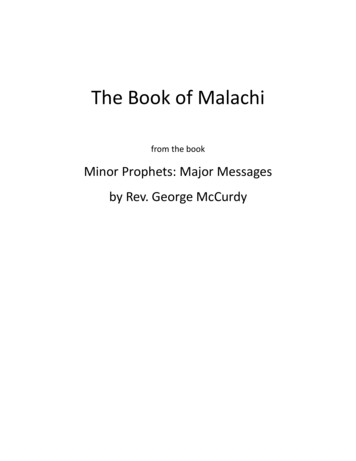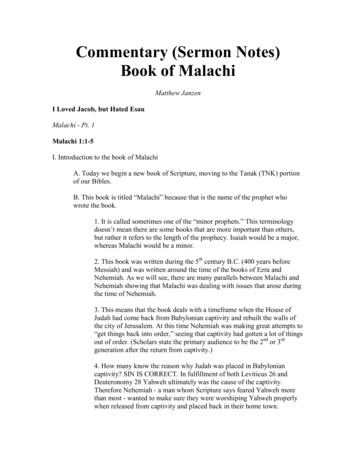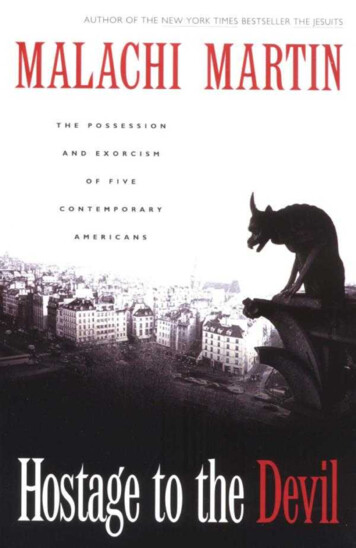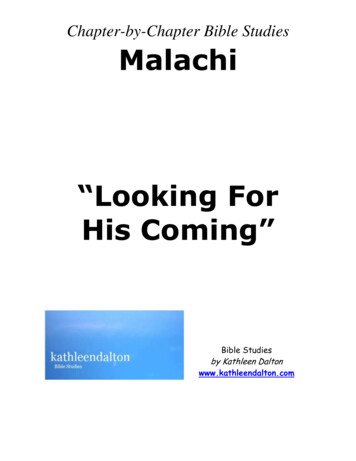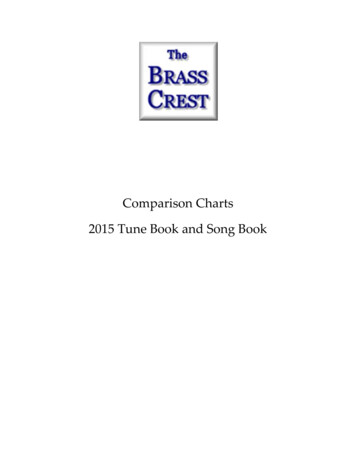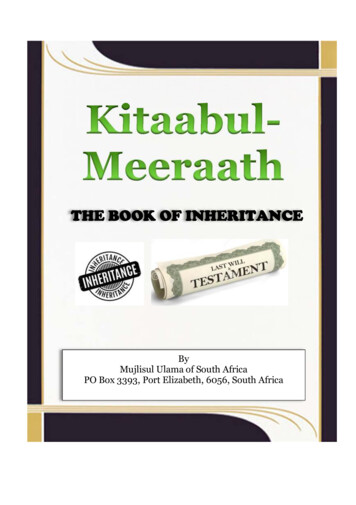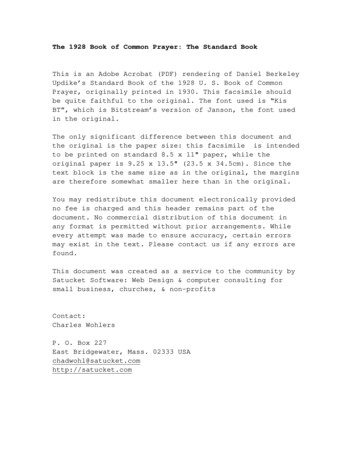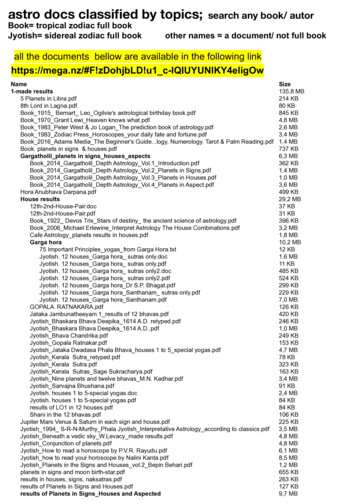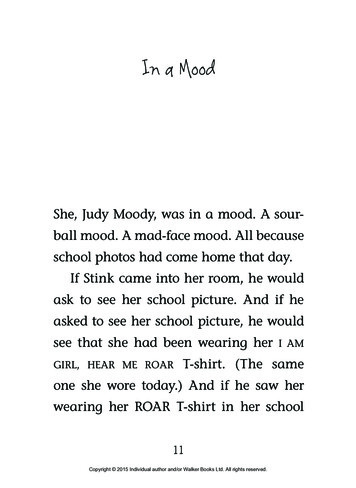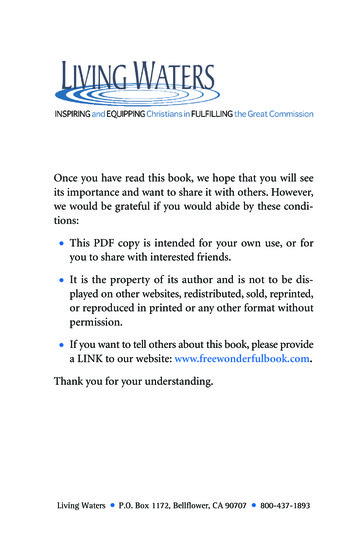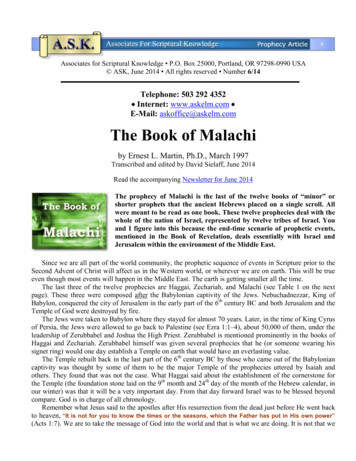
Transcription
Associates for Scriptural Knowledge P.O. Box 25000, Portland, OR 97298-0990 USA ASK, June 2014 All rights reserved Number 6/14Telephone: 503 292 4352 Internet: www.askelm.com E-Mail: askoffice@askelm.comThe Book of Malachiby Ernest L. Martin, Ph.D., March 1997Transcribed and edited by David Sielaff, June 2014Read the accompanying Newsletter for June 2014The prophecy of Malachi is the last of the twelve books of “minor” orshorter prophets that the ancient Hebrews placed on a single scroll. Allwere meant to be read as one book. These twelve prophecies deal with thewhole of the nation of Israel, represented by twelve tribes of Israel. Youand I figure into this because the end-time scenario of prophetic events,mentioned in the Book of Revelation, deals essentially with Israel andJerusalem within the environment of the Middle East.Since we are all part of the world community, the prophetic sequence of events in Scripture prior to theSecond Advent of Christ will affect us in the Western world, or wherever we are on earth. This will be trueeven though most events will happen in the Middle East. The earth is getting smaller all the time.The last three of the twelve prophecies are Haggai, Zechariah, and Malachi (see Table 1 on the nextpage). These three were composed after the Babylonian captivity of the Jews. Nebuchadnezzar, King ofBabylon, conquered the city of Jerusalem in the early part of the 6th century BC and both Jerusalem and theTemple of God were destroyed by fire.The Jews were taken to Babylon where they stayed for almost 70 years. Later, in the time of King Cyrusof Persia, the Jews were allowed to go back to Palestine (see Ezra 1:1–4), about 50,000 of them, under theleadership of Zerubbabel and Joshua the High Priest. Zerubbabel is mentioned prominently in the books ofHaggai and Zechariah. Zerubbabel himself was given several prophecies that he (or someone wearing hissignet ring) would one day establish a Temple on earth that would have an everlasting value.The Temple rebuilt back in the last part of the 6th century BC by those who came out of the Babyloniancaptivity was thought by some of them to be the major Temple of the prophecies uttered by Isaiah andothers. They found that was not the case. What Haggai said about the establishment of the cornerstone forthe Temple (the foundation stone laid on the 9th month and 24th day of the month of the Hebrew calendar, inour winter) was that it will be a very important day. From that day forward Israel was to be blessed beyondcompare. God is in charge of all chronology.Remember what Jesus said to the apostles after His resurrection from the dead just before He went backto heaven, “It is not for you to know the times or the seasons, which the Father has put in His own power”(Acts 1:7). We are to take the message of God into the world and that is what we are doing. It is not that we
2understand the chronological prophecies perfectly, as we do not. However, we are coming closer to the timeof the end. Daniel 12:4, 9 say that as we approach the time of the end, knowledge of the prophecies will beincreased, which includes chronology, geography, as well as major prophesied events.The Last Book, and Conclusion to the TwelveWe have in this last book of the Twelve Minor Prophets, a conclusion to that one scroll called the“Minor Prophets.” All of these prophecies concern Israel, Jerusalem, and the Temple whether a Temple wasdestroyed or rebuilt.In the Book of Malachi the last thing he says is to look for an Elijah to come in the future. Zechariahsaid to look for a Zerubbabel to come and for a Joshua the High Priest to come. He also said to look for twoanointed ones to come that the Book of Revelation calls the “Two Witnesses.”Jesus, when He was on earth some three or four hundred yearsTable 1: Structure of the Twelve Prophetslater, pointed to John the Baptist and said, “there is your Elijahright there.” He also said in Matthew chapter 17 when He was1Hoseatalking to the apostles that there was yet an Elijah to come. ThatJoel2message about the Elijah to come was the last prophecy of theAmos3Twelve Minor Prophets. Looking for an Elijah who will do what?AssyrianObadiah4He shall restore all things. 1 That is why Peter said in Acts 3:20–21,PeriodJonah5“the times of restitution of all things” were yet to come. A greatMicah6refreshment is coming when the full knowledge of the propheciesNahum7will be known before they all come to pass. You and I will begin tocomprehend chronology better, prophecy better, geography better,8 BabylonianHabakkukdoctrine better — everything much better as we get closer to theZephaniah9Periodtime of the end. It is up to God to open up all these things. Of our10HaggaiPostselves, we cannot understand these prophecies, even though they11 BabylonianZechariahare written in the Scriptures. God will allow us to understand2PeriodMALACHI12them.Malachi is the concluding book of the Twelve Minor Prophetsto the twelve tribes of Israel, because all of these prophecies concern Israel, Jerusalem, and the Temple,whether a Temple that was destroyed, a Temple to be rebuilt, or, as in Malachi, an extant rebuilt Temple. InMalachi, the center is Jerusalem.The last thing Malachi says is to look for an Elijah to come in the future. Zechariah said to look for aZerubbabel to come or a high priest named Joshua to come. He also said to look for two anointed ones to1Malachi chapter 4 tells of the Day of YHWH. Malachi 4:5–6 gives a prophecy of Elijah in a time before that Day. DWSSome prophecies are separated from one verse to the next by 2,000 years in some cases, as far as fulfillment is concerned. Iwant to warn all of you about such situations. However, I also want to show you that as we approach the end of the age,knowledge shall be increased. God through His Holy Spirit, through you, me, and others in the world who submit to Him, willgive more knowledge of what He intends to do as we approach this end of the age. There is a repetition of events in history. (SeeDr. Martin’s last article “The Great Generation and Modern Prophecy” which goes into this subject in detail.) Many prophecieswill be repeated exactly, point by point. For example, the Book of Revelation was written by Jesus Christ, but penned by theapostle John (Revelation 1:1–5). He garnered in all types of prophecies from various ages in which they were given to some 30different people. John took a scripture from Isaiah and put it into a prophetic context of the period just before the Second Adventof Christ. He did the same by going into the Psalms, the books of Jeremiah, Ezekiel, Daniel, and other places, putting them into aseries of events normally associated with the last seven year time span leading to Christ’s return. Then he gives us a type ofconnected prophetic scheme so you and I would be aware how to interpret the prophecies of the Old Testament, the Olivetprophecies, and those given by the apostle Paul. As time goes on and we approach that period, God says He will open up moreknowledge. The Bible was intended for you and for me at this present time. The apostle Paul said in 1 Corinthians chapter 10 thatall the events mentioned in the Holy Scriptures were for us: “Now all these things happened unto them for ensamples: and theyare written for our admonition, upon whom the ends of the world are come” (1 Corinthians 10:11). ELM2
3come, who are called the two witnesses in Revelation 11:1–14. 3 They will restore the knowledge of thetruth. We will be able to understand chronology, prophecy, geography, and doctrine much better, as we getcloser to the time. We are beginning to grow in grace and in knowledge as never before.The Book of Malachi told about times in our future. True, the environment in which he wrote was thelast part of the 5th century BC, some 430 or perhaps 420 years before the birth of Jesus on this earth. 4 Thatwas the historical environment, and we find within his writings information concerning that time. I will givethat to you because you cannot understand Malachi without knowing the history, the context in which it iswritten. It centers on Jerusalem, the temple (on the priesthood primarily), and the people of Israel, and whatthey were doing at the time.BackgroundWhat is described here is a period of great disappointment. As I indicated in my presentation on Haggai,it was a time after the Babylonian captivity, when they were not experiencing what they thought they shouldexperience. They came back to Jerusalem. They thought they obeyed God by doing so. But in Haggai thefirst chapter he said, “consider your ways,” because you have not done what I told you to do. They returnedto Jerusalem, they started to build their own houses, but they forgot God’s house. Because God’s house wasforgotten, He brought on them drought, mildew, problems, and difficulties.Haggai said if Israel changed their ways, the very moment that they lay the foundation stone on thetemple, which is in the month of Chislev, the 9th month and the 24th day of the month, from that day on Godwill bless you (Haggai 2:18–19). He left it at that. He also said Zerubbabel would be the one to have a signetand he would finalize the Temple. The Book of Haggai ended with that statement.Two months later Zechariah comes along. In my presentation on Zechariah, that prophet had to explainwhat Haggai did not mean. Zechariah and Haggai were contemporaneous and lived about 60–70 yearsbefore Malachi. Zechariah came along and said what Haggai said about your blessing is true, but theJerusalem and the Temple he is talking about is a future Jerusalem, a future Temple, a future High PriestJoshua. He is talking about a future Zerubbabel, a Prince of Israel through David. He is talking about future“Sons of Oil” known as the Two Witnesses in Revelation 11:1–14. Zechariah came to explain what Haggaisaid, because after the time of Haggai, instead of being blessed after the 9th month the 24th day of the month,all the problems the people complained about continued.Sixty years later, we read Malachi and they were still having difficulties. They still had not come to theprosperity they expected. You can imagine how many of the Jews who returned from Babylon would havebeen upset. They were saying, look, we have done our job, when in fact God said they had not. They had notdone things the way that they should have. They should have considered their ways.Haggai went on to say you are still unclean, and I can prove it. He said, “If a man touches a dead body isnot the man himself unclean and cannot go into the temple?” And they said, “yes.” He said, “that is the waythis nation is.” You are still unclean (Haggai 2:13–14). They were unclean and in the Book of Zechariahthey continued to be unclean. Still later Zechariah said, “I will remove the iniquity of that land in one day.”(Zechariah 3:9–10). That sin will be taken away when the Branch came, the one who Zechariah said wouldcome. That Branch was Jesus Christ. That Branch was to have seven eyes, symbolically speaking, that couldsee all things on the earth. 53See Dr. Martin’s three powerful presentations “The Book of Haggai,” “Book of Haggai, Time Prophecies,” and “The Book ofZechariah,” which give further information regarding the future Zerubbabel and Joshua the high priest. Regarding Elijah, Jesuspointed out some 400 years later and identified John the Baptist as the Elijah. He also said to His apostles in Matthew chapter 17that there is yet an Elijah to come. Malachi is the source of Jesus’ reference. See “The Elijah to Come.” DWS4We cannot be sure when Malachi received and wrote his prophecy. DWS5In the Book of Revelation chapter 5, you find that Jesus was known as the Lamb with 7 eyes, 7 pairs of eyes, which is a symbol, of course. That means He has the seven spirits, able to know everything that is happening on earth. In fact, He is the one who
4The prophets were trying to tell Israel that they should depend upon God, who controls chronology(Daniel 2:21). 6 God did say in the Book of Zechariah that these events Israel thought would take place backthere, will take place exactly as prophesied.Here is what they expected to happen when they returned from Babylon. Read the first chapter of Ezra 7:“Now in the first year of Cyrus King of Persia, that the word of YHWH by the mouth of Jeremiahmight be fulfilled, YHWH stirred up the spirit of Cyrus the King of Persia, that he made aproclamation throughout all his kingdom, and he put it also in writing, saying,‘Thus says Cyrus, King of Persia, YHWH God of heaven has given me all the kingdoms of theearth: and he has charged me to build him an house at Jerusalem, which is in Judah. Who isthere among you of all his people? His God be with him, and let him go up to Jerusalem,which is in Judah, [to do what?] and build the house of YHWH God of Israel, (he is the God,)which is in Jerusalem.’” Ezra 1:1–3Cyrus, King of Persia, said that and there was a prophecy in the Book of Isaiah that spoke about this prophecy upon which the Jews were depending. Go to Isaiah chapter 44. I give this to show what the Jews wereexpecting and why Malachi tells them what will happen in the future. They expected it to happen then.Malachi says it will be in the future. 8Here is the prophecy that the Jews returning to Jerusalem (under Zerubbabel and Joshua the High Priest,about 50,000 of them) were relying upon. They were reading this prophecy of Isaiah:“Remember these, O Jacob and Israel; for you are my servant: I have formed you; you are myservant: O Israel, you shall not be forgotten of me. I have blotted out, as a thick cloud, yourtransgressions.” Isaiah 44:21–22This blotting out of their transgressions is a very good thing. Other benefits will then occur:“ You shall be inhabited, and to the cities of Judah, you shall be built, and I will raise up thedecayed places thereof. .That says of Cyrus, ‘He is my shepherd [Cyrus who will let them return], and shall perform all mypleasure: even saying to Jerusa
The Book of Malachi . by Ernest L. Martin, Ph.D., March 1997. Transcribed and edited by David Sielaff, June 2014 . Read the accompanying. Newsletter for June 2014 . The prophecy of Malachi is the last of the twelve books of “minor” or shorter prophets that the ancient Hebrews placed on . All a single scroll were meant to be read as one book. These twelve prophecies deal with the whole of .
